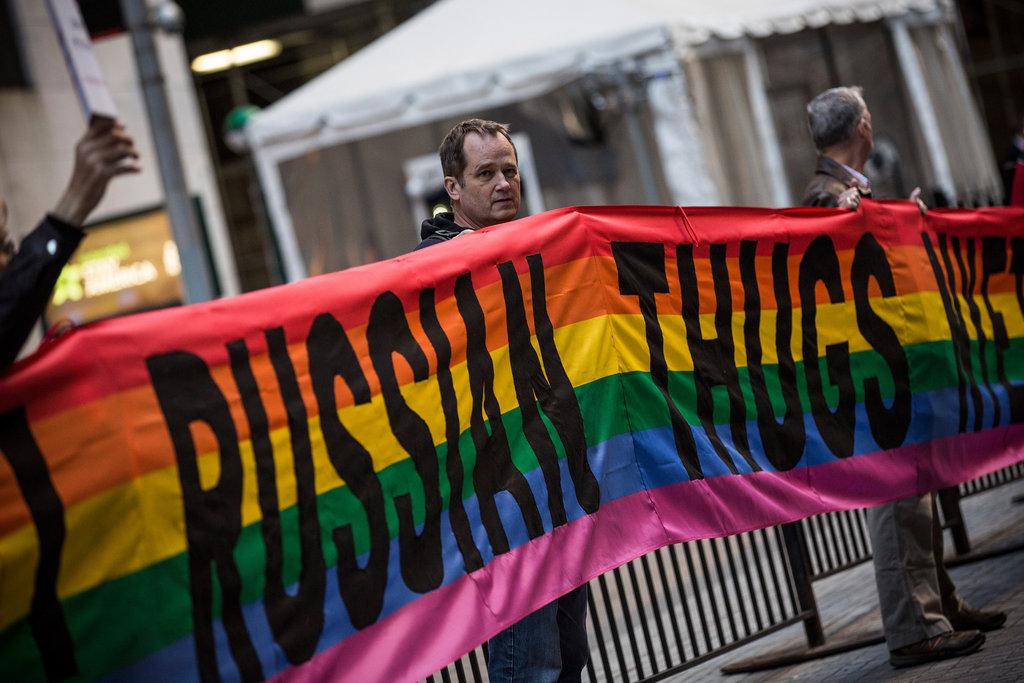Russian activists work to maximize Olympic spotlight amid anti-gay violence
Members and supporters of the Lesbian/Gay/Bisexual/Transgender/Intersex (LGBTI) community protest US economic trading with Russian companies outside the New York Stock Exchange on November 18, 2013 in New York City. Russia passed anti-LGBTI laws over the summer, including laws that effectively make any pro-gay statements or demonstrations illegal.
With the Winter Olympics in Sochi still two months away, Russia's LGBTI advocacy community is already preparing for what happens when the Games are over.
"The experience of previous Olympic Games is not very optimistic in this regard," said Anastasia Smirnova, an activist representing a coalition of six Russian LGBT organizations at the United Nations on Tuesday. "As soon as attention is drawn away, ugly things start happening."
Part of a panel called "Sport Comes Out Against Homophobia" on International Human Rights Day, Smirnova spoke about Russia's violent turn toward repression of the country's lesbian, gay, bisexual, transgender and intersex citizens ahead of the Olympics, marked by a new national law limiting speech about homosexuality and frequent gay-bashing attacks across the country by both police and civilians.
The panel featured professional athletes including tennis star Martina Navratilova and NBA player Jason Collins.
Smirnova urged the International Olympic Committee to make a public pronouncement that LGBTI athletes and spectators must be protected in Sochi, in line with the Olympic Charter, which states: "Any form of discrimination with regard to a country or a person on grounds of race, religion, politics, gender or otherwise is incompatible with belonging to the Olympic Movement."
"We hope that the IOC takes a further step and shows visible support of those how speak up for human rights, who exercise their individual freedom of expression," Smirnova said. She stopped short of asking Olympic athletes to protest in Sochi, a day after IOC President Thomas Bach warned against athletes doing so. Protesters will be limited to "protest zones."
"Obviously any support is extremely valuable," Smirnova said. "At the same time it is a question of individual choice to speak up and to use the credibility among fans and followers that the athletes have to change hearts and minds. We hope that this message will be delivered at the Games but we don't want to put pressure on those who may be in a high-risk situation for doing so."
Russian advocates met with Bach in Paris last month to encourage him "to launch an independent investigation on the legal implications of the anti-gay laws in effect in Russia during the Olympic Games."
So far there has been no indication that the IOC will issue a bold proclamation on the treatment of LGBTI people in Russia. But Smirnova said the impending Olympics offer a window of opportunity that will close in late February.
"This spotlight that is now on Russia helped us shine light on the ugliest developments for LGBTI people," she said. "It helps us to know that the world is watching. It helps us to make sure we will be safe when the spotlight of the Olympic Games is turned away from Russia."
This week the International Gay and Lesbian Human Rights Commission (IGLHRC) is hosting a series of events and meetings at the United Nations in New York City featuring representatives from South Africa, Nigeria, Uganda, Zambia, Namibia, Zimbabwe, Malawi, Burma, Malaysia, the Philippines, Russia, Turkey, Iran, Chile, Columbia, and St. Lucia.
Addressing a meeting of LGBT rights advocates earlier Tuesday, US Ambassador to the United Nations Samantha Power called Russia's LGBT law "outrageous" and urged Western leaders to speak up.
"To criticize the criminalization of LGBT status is not cultural imperialism,” Power said. “To deny gays and lesbians the right to live freely and to threaten them with discrimination and even death is not a form of moral or religious Puritanism. It’s in fact barbarism.”
The story you just read is accessible and free to all because thousands of listeners and readers contribute to our nonprofit newsroom. We go deep to bring you the human-centered international reporting that you know you can trust. To do this work and to do it well, we rely on the support of our listeners. If you appreciated our coverage this year, if there was a story that made you pause or a song that moved you, would you consider making a gift to sustain our work through 2024 and beyond?
